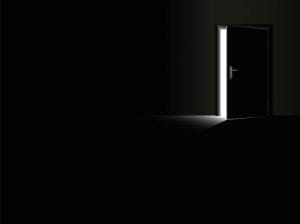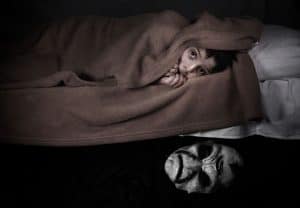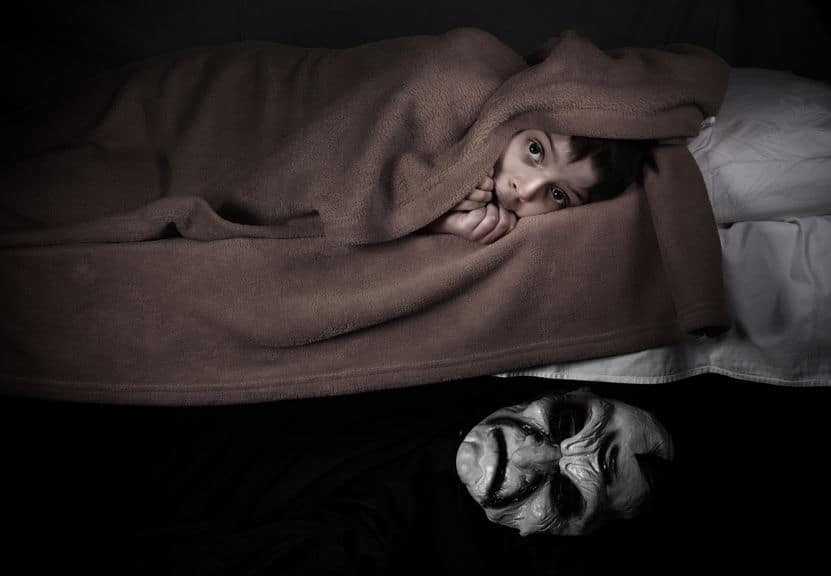Share This Article
An Overview of Nyctophobia – the Fear of the Dark
Are you afraid of the dark? Why?
A generalized fear of the dark is universal enough to be one of the most common phobias in the world. Children all over the world have long feared what lurks in the shadows or darkness of night. Simply put, they are afraid of the dark.
While we often shrug it off as something childish, that fear can persist into adulthood.
Why does this fear sometimes persist? What is the nature of this phobia? Why we do we suffer from a fear of darkness, and what can we do to shed some light on it?
What is Nyctophobia
What is the fear of the dark called? That would be nyctophobia. We get the term nyctophobia from the Greek term for night, nyktos.
One way a fear of the dark distinguishes itself from other phobias is that it’s somewhat “accepted” by many as a “normal” part of childhood. While an extreme phobia of the dark can have serious consequences, a basic fear of the dark is so common among children that it is often portrayed not as a serious condition requiring psychological treatment or medication, but rather simply a stage one matures past with age.
There’s a reason why Are You Afraid of the Dark? is both a common childhood question and a children’s horror anthology series which aired on Nickelodeon in the 1990s.

But what if your fear of the dark extends beyond that? While being afraid of the dark is common among children, when that fear extends into adulthood or becomes so severe as to be socially or psychologically paralyzing, we start to get into the ground covered by nyctophobia. This is the clinical description of a phobia of the dark as recognized by the DSM-5.
Severity is thus the primary determining factor in diagnosing nyctophobia. Uneasy about strange looking shadows at night or not wanting to sleep without a nightlight? That’s likely mild enough to be a “normal” fear of night.
Suffering from insomnia because you cannot sleep due to fear of darkness, or missing important life events because you can’t bear the thought of going out at night? That’s more likely to be a form of nyctophobia.
What Causes Nyctophobia
It is fair to say that one of the best guesses we have about the underlying causes of nyctophobia is that it stems from survival instincts embedded deep in our psyche. The human eye isn’t as well-adapted for night vision as the eyes of owls, bats, many rodent species, and other creatures of the night are. As a result, the darkness became a source of the unknown—and for early humans, the unknown often meant death. The darkness could hide all manner of threats, especially predators.
Triggers and Symptoms for the Fear of the Dark
There are a wide variety of potential triggers for a fear of the dark, including the following:
- Anxiety from others: Fear has a way of multiplying itself, and phobias are often learned from those around us. This is especially true of children, who are highly impressionable. If you have someone in your family who is fearful of the dark, they may transfer that phobia to you if you notice their anxiety relating to the darkness at an early age.
- Over-protectiveness: Related to anxiety, over-protectiveness can sometimes backfire. Rather than cause children to feel protected and secure, it can instead give them the impression that danger lies around every corner. The fear of the unknown can run rampant when it is allowed to extend to so much of life as a result of having been sheltered from exposure and a knowledge of things. A shadow may just be a shadow, but if you have been sheltered from the outside world, you can start to project all manner of imaginary terrors to be lurking within it.
- Prior trauma: This is one of the most common causes of phobias, and it applies here. If you have had a traumatic incident involving darkness, it can lead to a full-blown phobia. For example, if you suffered a fall while out at night in your youth, you may associate the darkness with danger.
- Projection: We also have a way of projecting our fear of the unknown or personal trauma onto darkness. In “The Raven,” Edgar Allan Poe’s narrator famously describes himself “deep into that darkness peering” as he stands “wondering, fearing” and contemplating the loss of his wife, Lenore. Remembrance of that loss haunts him throughout the poem, as do shadows and images of darkness. From a psychological standpoint, the narrator’s fear of the darkness may be a manifestation of projected fear of death and personal loss—which is indeed at the root of some forms of nyctophobia.
- Human nature: As stated above, a fear of darkness is, to some extent, probably an evolutionary outcome of our ancestors having lived in fear of nocturnal predators and other dangers. Over time , that likely gave way to survival instincts. This sociological and psychological component may combine with some genetic predispositions against darkness in some people. For example, scientists have discovered a startle response which, when triggered, releases chemicals which heighten awareness and anxiety. Darkness can trigger this startle response, which in some can trigger nyctophobia.

Some common symptoms of nyctophobia include the following:
- An extreme fear characterized by reactions such as severe anxiety or panic attacks.
- A fear that is enduring rather than fleeting, and does not abate with age.
- Avoidance of places, situations, or events due to your fear.
- Elevated heart rate.
- Chest tightness.
- Sweating.
- Upset stomach.
- A feeling of powerlessness.
- Imagining death and darkness to be imminent and intertwined.
- Difficulty breathing.
- Trembling.
- Significant difficulty sleeping resulting from your phobia.
- Feeling like you need to “escape” from the darkness.
- A sense that you are somehow detached from reality.
Treatment Options for Nyctophobia, How to Overcome a fear of the Dark
How to not be afraid of the dark. One of the most important questions to answer when confronting the issue of how to overcome a fear of the dark is whether you even need treatment in the first place. Again, in mild forms and especially among children, this fear is both common and often best “treated” by simply allowing the subject to mature out of it.
However, for those for whom that fear persists past childhood or is especially severe, treatments for nyctophobia typically take on the form of exposure treatment. As the name suggests, this typically involves controlled exposure to darkness.
In addition to this, you may be asked to consider cognitive behavioral treatment. CBT works by changing your mental associations so that the thought of darkness is no longer connected with things which trigger fear.
Sometimes you might simply be told to “relax.” Though this is obviously easier said than done when you are confronted with a severe phobia, breathing exercises and other relaxation techniques can nevertheless be an effective treatment for some in easing their nyctophobia.
Compared to some other phobias, CBT and exposure therapy are emphasized as treatments more than medical solutions. There are several reasons for this, not the least of which being that these are relatively sparse for nyctophobia compared to other conditions.
In summary, what is the fear of the dark? It can be anything from a growing experience in childhood to a paralyzing terror of the unknown. Everyone’s experience with nyctophobia is different. If treatment might be best for you, your best bet moving forward is to seek assistance from psychological experts who can help you illuminate that darkness. Don’t be afraid of the dark.



